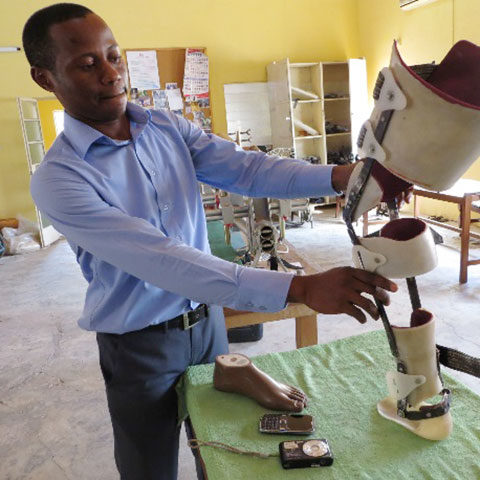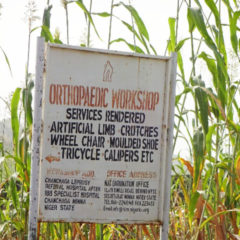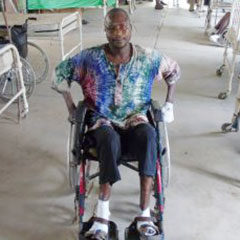
Independence, mobility and dignity
Nigeria, bordered by Benin, Chad, Cameroon and Niger, has the largest population in Africa with over 186 million people. In recent years, conflict has been rife including the brutal and long-running Boko Haram insurgency throughout north-eastern Nigeria, frequent bouts of militancy and piracy in the Niger Delta and increasingly common communal violence across central Nigeria. Despite the country being rich in oil, few Nigerians have benefited and some of the country’s biggest problems include corruption, crime, a lack of infrastructure and unemployment. These issues are hardest on the poor.
Chanchaga Orthopaedic Workshop in Minna, Niger State, Nigeria is one of the few orthopaedic workshops in Nigeria. The workshop produces mobility devices such as prosthetic limbs and moulded shoes for people with leprosy-related impairments and other disabilities, and distributes other devices such as crutches, wheelchairs and protective footwear.
Because of the orthopaedic team marketing their services, by visiting other hospitals and traditional bone setters, an increasing number of paying clients are helping to subsidise the service offered to leprosy affected people. For example, the team was asked to make a specialised brace for two soldiers which was completed to such a high standard that it has led to referrals to the workshop to help other Nigerian soldiers injured during the conflict with Boko Haram.

Nigeria was severely affected by recession throughout 2016 and 2017 caused by the oil price crash, devaluation of the Naira and continued conflict with Boko Haram, and this has doubly impacted the workshop by increasing the costs of component parts and making it harder for potential general patients to afford the workshop’s products and services.
ILEP Member The Leprosy Mission is helping the workshop to become a more sustainable social enterprise: continuing to serve people affected by leprosy for free, but also increasing its customer base to include other people with disabilities and providing a wider range of quality orthopaedic services and products. The workshop is also improving its marketing activities, and upgrading its facilities and services.
Ashar’s story

Ashar is about 50 years old. He has seven siblings, three brothers and four sisters. His parents were farmers and traders. Neither his parents nor his any of his siblings have had leprosy. When he was about 18 years old he noticed that he had discoloured patches on his skin on his face, cheeks and forehead, and he was diagnosed with leprosy in 1985.
For many years he was treated with traditional medicine for his leprosy which had no effect. It was only when he started losing his fingernails that he went to a leprosy hospital where he was treated with the correct multidrug therapy. Because of the characteristic lack of sensation in his feet, Ashar had trodden on stones which pierced his feet and then caused wounds and ulcers and he was confined to a wheelchair. Ashar’s hands are also severely deformed due to leprosy.
The team at Chanchaga Orthopaedic Workshop made some disability aids for Ashar which fit to his wrist using Velcro. He can use these to hold a toothbrush, spoon or torch so that he is more independent. He says, “life is much easier now.”